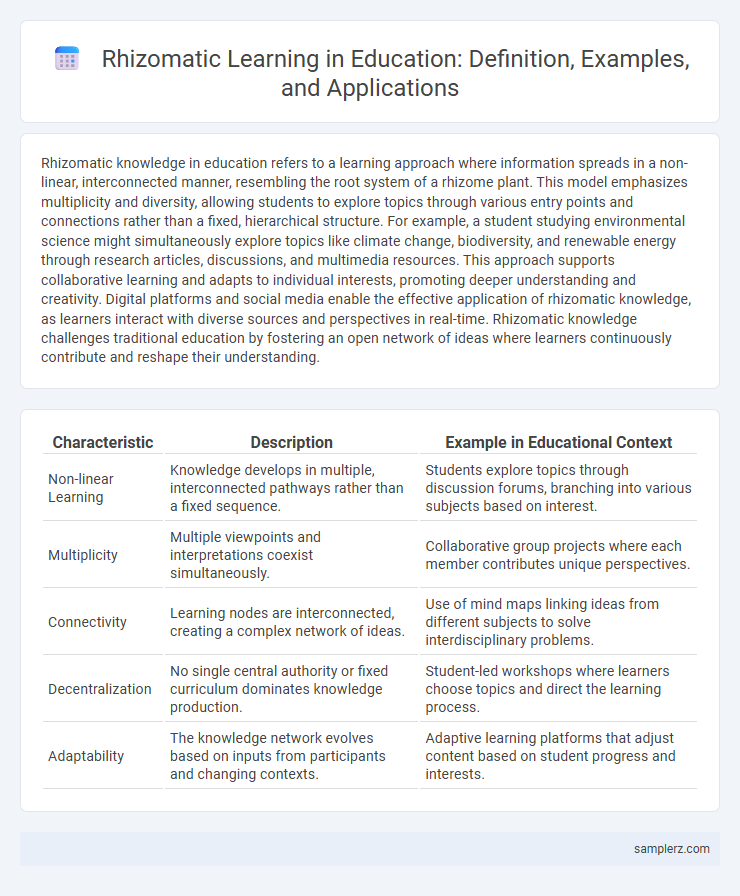Rhizomatic knowledge in education refers to a learning approach where information spreads in a non-linear, interconnected manner, resembling the root system of a rhizome plant. This model emphasizes multiplicity and diversity, allowing students to explore topics through various entry points and connections rather than a fixed, hierarchical structure. For example, a student studying environmental science might simultaneously explore topics like climate change, biodiversity, and renewable energy through research articles, discussions, and multimedia resources. This approach supports collaborative learning and adapts to individual interests, promoting deeper understanding and creativity. Digital platforms and social media enable the effective application of rhizomatic knowledge, as learners interact with diverse sources and perspectives in real-time. Rhizomatic knowledge challenges traditional education by fostering an open network of ideas where learners continuously contribute and reshape their understanding.
Table of Comparison
| Characteristic | Description | Example in Educational Context |
|---|---|---|
| Non-linear Learning | Knowledge develops in multiple, interconnected pathways rather than a fixed sequence. | Students explore topics through discussion forums, branching into various subjects based on interest. |
| Multiplicity | Multiple viewpoints and interpretations coexist simultaneously. | Collaborative group projects where each member contributes unique perspectives. |
| Connectivity | Learning nodes are interconnected, creating a complex network of ideas. | Use of mind maps linking ideas from different subjects to solve interdisciplinary problems. |
| Decentralization | No single central authority or fixed curriculum dominates knowledge production. | Student-led workshops where learners choose topics and direct the learning process. |
| Adaptability | The knowledge network evolves based on inputs from participants and changing contexts. | Adaptive learning platforms that adjust content based on student progress and interests. |
Understanding Rhizomatic Learning in Education
Rhizomatic learning, inspired by Deleuze and Guattari's concept, emphasizes knowledge as non-linear, interconnected, and evolving through multiple pathways. This approach challenges traditional hierarchical education models by promoting collaborative knowledge construction and diverse perspectives within learner communities. In education, rhizomatic learning fosters critical thinking, adaptability, and personalized exploration, allowing students to navigate complex information ecosystems dynamically.
Key Principles of Rhizomatic Knowledge
Rhizomatic knowledge rejects traditional hierarchical structures, emphasizing multiple entry and exit points in the learning process, where knowledge is non-linear and constantly evolving through connections. It promotes learner autonomy by encouraging collaboration, adaptability, and the co-construction of meaning across diverse contexts. This approach values chaos and complexity, recognizing that knowledge grows through exploration and interaction rather than fixed curricula.
Real-World Examples of Rhizomatic Knowledge Sharing
In education, rhizomatic knowledge sharing manifests through collaborative platforms like Wikipedia, where information is continuously edited and expanded by diverse contributors. Online open-source projects such as GitHub enable learners to co-create and iterate on code, reflecting non-linear, interconnected learning pathways. Community-driven forums like Stack Exchange further exemplify rhizomatic learning by facilitating dynamic, peer-to-peer problem-solving and knowledge exchange without hierarchical constraints.
Rhizomatic Structures in Collaborative Learning
Rhizomatic structures in collaborative learning emphasize nonlinear, decentralized knowledge construction where learners actively contribute to and navigate multiple interconnected ideas. This approach fosters organic growth of understanding through peer interactions, reflecting the multifaceted nature of knowledge acquisition beyond traditional hierarchical models. Educational environments implementing rhizomatic frameworks often utilize discussion forums, project-based teams, and open-source platforms to facilitate dynamic, networked learning experiences.
Case Studies: Rhizomatic Approaches in Classrooms
Case studies in classrooms demonstrate rhizomatic learning by emphasizing non-linear knowledge acquisition and learner autonomy, allowing students to navigate subjects through interconnected ideas rather than fixed curricula. Teachers facilitate dynamic environments where students explore concepts collaboratively, reflecting Deleuze and Guattari's concept of knowledge as a multiplicity of pathways. This approach enhances critical thinking and adaptability, crucial skills in contemporary education landscapes.
Digital Platforms Facilitating Rhizomatic Knowledge
Digital platforms such as Wikipedia, Reddit, and open online courses create dynamic environments where knowledge grows rhizomatically through user-generated content and collaborative learning networks. These platforms enable non-linear pathways for knowledge acquisition, allowing learners to explore interconnected concepts and diverse perspectives simultaneously. By fostering continuous interaction and decentralized knowledge exchange, digital platforms exemplify rhizomatic learning in the education ecosystem.
Rhizomatic Learning vs. Traditional Educational Models
Rhizomatic learning emphasizes decentralized, non-linear knowledge construction where learners collaboratively explore content, contrasting with traditional educational models that rely on fixed curricula and hierarchical teacher-student dynamics. It fosters adaptive learning paths and critical thinking by encouraging connections across diverse ideas and experiences rather than memorizing predefined information. This approach aligns with heutagogy principles, promoting learner autonomy and continuous knowledge evolution in digital and real-world contexts.
Challenges and Opportunities in Rhizomatic Knowledge
Rhizomatic knowledge, characterized by its nonlinear and interconnected structure, challenges traditional educational models by resisting hierarchical curricula and standardized assessments, which can lead to difficulties in measuring learning outcomes. Opportunities arise from this complexity, fostering personalized learning paths and collaborative knowledge construction that adapt to diverse learner needs and real-world problem-solving. This approach encourages the development of critical thinking and adaptability, essential skills in an ever-evolving global information landscape.
Cultivating Creativity through Rhizomatic Approaches
Rhizomatic learning fosters creativity by encouraging learners to explore knowledge non-linearly, connecting diverse ideas and disciplines organically. This approach cultivates critical thinking and innovation by allowing students to navigate information pathways independently rather than following predetermined curricula. Digital platforms and collaborative projects exemplify rhizomatic practices, enabling dynamic knowledge construction and personalized discovery.
Future Prospects of Rhizomatic Knowledge in Education
Rhizomatic knowledge emphasizes nonlinear, collaborative learning processes that mirror the interconnected growth of plant roots, fostering adaptability and creativity in students. Future prospects include integrating digital platforms that support decentralized knowledge construction, enabling personalized learning pathways beyond traditional curricula. This approach promises to cultivate critical thinking and lifelong learning skills essential for navigating rapidly evolving educational and professional landscapes.

example of rhizomatic in knowledge Infographic
 samplerz.com
samplerz.com